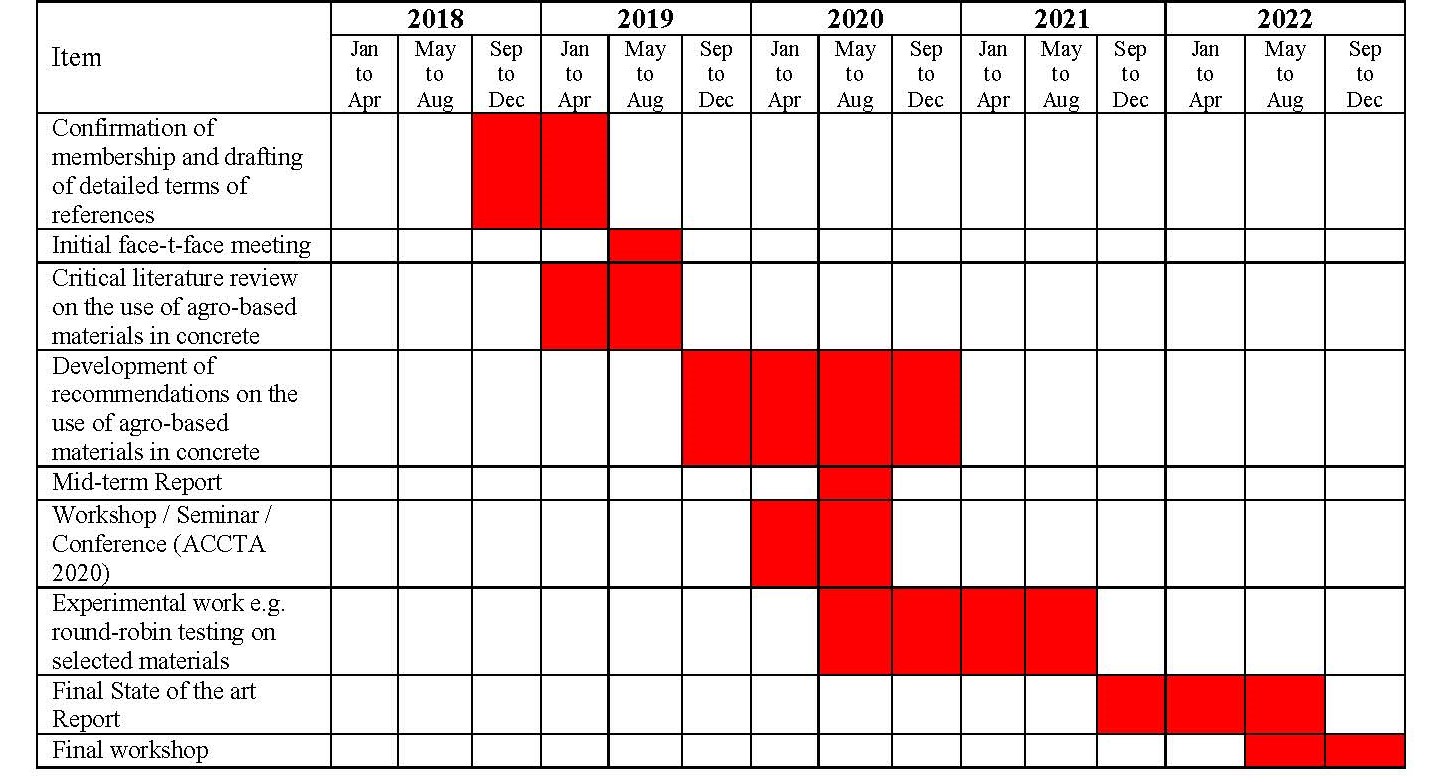Technical Committee 291-AMC
General Information
Deputy Chair: Dr. Mike B. OTIENO
Activity ending in: 2025
Cluster A
Subject matter
Material: study of characteristics and properties of concretes made using agro-based materials as cementitious additions in concrete and cement-based materials. These addition include rice hush-ash, cassava peel ashes, groundnut shells, bamboo leafs, locust beans coconut, bagasse and others.
- This TC will focus on the agro-based materials that can be used as cementitious additions in regions where established materials are not available or too expensive, as in the global South (with focus on sub-Saharan Africa).
- Focus will mainly be on fresh (plastic), strength and durability properties. Aspects such as creep and shrinkage, andfracture characteristics of mortar and/or concrete may be covered but will not form the core of this TC.
- Promote the use of agro-based materials.
Terms of reference
- The TC will have regular meetings with its members where the tasks will be shared and strict deadlines set. Meetings will be held via Skype on a regular basis as will be agreed by the TC members. Face-to-face meetings will also be scheduled to be held from time to time, especially at major conference gatherings.
- Minutes of each meeting will be taken by the TC secretary and thereafter circulated to all members after the meeting for follow-up in their tasks. The secretary will be responsible for ensuring that the strict deadlines are adhered to by the TC members.
- Any milestones hindering the work of the TC will be reported to RILEM secretariat with a view to seeking assistance.

- At present, the prospective members of this TC are mainly from Africa, with a few interested parties from Europe and Middle East. The objective is to expand on the geographical membership of this TC in order to expand on the scope of agro-based materials considered in the State of the art Report.
- The present membership number stands at 27. This is expected to increase to around 30-40 as the TC becomes known.
- The work involves a bibliographical research to get the state of the art as is indicated above.
- The work of the TC will have a direct industrial relevance in cement production and construction industries.
Detailed working programme
- Availability of agro-based materials for use in concrete and cement-based materials, including the geographical distribution thereof
- A critical review of existing literature on the use of agro-based materials in concrete and cement-based materials in general
- Applicability of concrete incorporating agro-based materials
- Durability characteristics of concretes and cement-based materials incorporating agro-based materials as cementitious or non-cementitious additions
- Strength characteristics of concretes incorporating agro-based materials as cementitious or non-cementitious additions
- Summary of engineering applications (if available) to promote the application of agrowastes in construction and promote sustainable development.
Technical environment
This TC will help in collating and consequently advancing knowledge related to the use of agro-based materials in concrete and cement-based materials which is becoming more and more common in Africa. To some extent, it will further the work of TC 236-BBM (Bio-aggregates based building materials) which focused mainly on aggregates. This TC will focus on the use of agro-based materials as cementitious additions in concrete.
Expected achievements
The benefits of this TC will include the following:
- Create awareness on the use of agro-based materials in concrete and cement-based materials;
- Collate and critically review the existing literature on the use of agro-based materials in concrete and provide recommendations on the way forward;
- This TC will bring together, for the first time, a majority of African scholars to create a formidable team in the field of concrete;
- Contribute towards making concrete and cement-based materials more sustainable by, where possible, reduce the amount of plain Portland cement used to make concrete and cement-based materials.
- Giving examples of good practices and pointing out the limitations
- Building a shared database on agro-based materials in Africa for open access
Will the TC produce:
- terminology, bibliography? YES
- harmonised test methods, recommendations? NO
- state-of-the-art report? YES
- educational material? YES
Will the TC organise symposia, exhibitions, educational events (courses, tutorials etc.)? YES
Group of users
- Academics, practitioners, general public, Ph.D students, others.
- End-users and contractors
- Governmental institutions
- Materials suppliers
Specific use of the results
- There are no economic impacts to be evaluated at this stage.
- The TC will spark future academic research in the area of sustainable cementitious materials and applications, and inspire young researchers to work on material solutions available in the global South
- Since majority of members in the TC are involved in education, the TC will further have impact on academic curricula
- The TC will create a strong African network in research and education





